Barnett-class lifeboat
The Barnett-class lifeboat consists of three types of non self-righting displacement hull lifeboats operated by the Royal National Lifeboat Institution (RNLI) from its stations around the coasts of the United Kingdom and Ireland between 1923 and 1987.
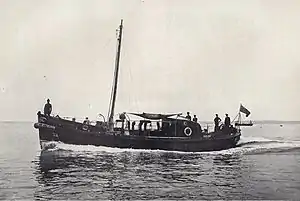 RNLB William and Kate Johnston (ON 682) | |
| Class overview | |
|---|---|
| Builders |
|
| Operators | Royal National Lifeboat Institution |
| Built |
|
| In service | 1923–1987 |
| Completed |
|
| Retired | 37 |
| General characteristics | |
| Type | Motor lifeboat |
| Displacement |
|
| Length | 51–60 ft (16–18 m) |
| Beam |
|
| Installed power |
|
| Propulsion | 2 × pitch propellers in tunnels |
| Speed | 9.5 knots (10.9 mph; 17.6 km/h) |
| Range | 300 nautical miles (350 mi; 560 km) |
| Crew | 6 |
60 ft Barnett
History
The 60 ft (18.3 m) Barnett was the first twin-engined, twin-screw RNLI lifeboat, and when introduced in 1923, the largest. Designed by RNLI naval architect James Rennie Barnett, the boats pioneered many features which were to become standard on future lifeboats. They were, however too large to be slipway launched and had to be moored afloat at a time when the RNLI preferred to keep lifeboats in boathouses and consequently, only four were built.
Description
The boats had an open aft cockpit with a shelter ahead of it. The engines were in separate watertight engines rooms with exhaust taken up two side by side funnels amidships. There were fore and aft survivor cabins below deck. The boats were powered by two RNLI designed 80 bhp DE6 6-cylinder petrol engines, three built by Weyburn Engineering and the other by J. Samuel White. The final boat was 61 ft (18.6 m) long due to a forward raked bow. The boats served their stations well until the early fifties when they were replaced by 52 ft Barnetts.
Fleet
| ON[lower-alpha 1] | Name | Builder | In service | Principal Station | Disposal | Image |
|---|---|---|---|---|---|---|
| 682 | William and Kate Johnston | J Samuel White, Cowes | 1923–1950 | New Brighton | Sold December 1950 |  |
| 693 | Emma Constance | S. E. Saunders, Cowes | 1926–1951 | Aberdeen | Sold November 1951 | 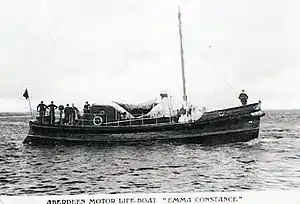 |
| 696 | Robert & Marcella Beck | J Samuel White, Cowes | 1926–1952 | Plymouth | Sold June 1952 | |
| 715 | Princess Mary | S. E. Saunders, Cowes | 1929–1952 | Padstow | Sold June 1952 |
51 ft Barnett
History
The 60 ft Barnett was too large and heavy to be slipway launched and so the 51 ft (15.5 m) type was designed as a scaled down version which would be able to be stationed at a greater number of locations. The class is sometimes referred to as the "Stromness" after the first station to receive one.
Description
The 51 ft Barnett had an open aft cockpit with a shelter ahead of it giving access to the engine room. Ahead of the engine room was a survivor cabin and there was a forward shelter ahead of the mast. The class was powered by two 60 bhp Weyburn CE6 6-cylinder petrol engines with a single exhaust funnel ahead of the aft shelter.
The final boat of the class, RNLB Southern Africa (ON 860), was built in 1949;, fourteen years after the end of regular production, and was more akin in deck layout to the first five 46ft 9in Watson-class boats built around the same time. This boat was powered by two 60 bhp Ferry VE6 6-cylinder diesels and was in effect a prototype for a post war production run of diesel powered boats. However, it was overtaken by events as James Barnett turned to midships cockpits and the new boats emerged as the 52 ft [15.8 m] class the following year. The only other 51 ft Watson to receive diesel engines was ON 755 which was re-engined with twin Ford based 65 bhp Parsons Barracuda diesels in 1965. In 1976, ON 860 also received Barracudas while serving in the relief fleet and this boat was the final member of the class in service when retired in 1981.
Fleet
| ON[lower-alpha 1] | Name | Builder | In service | Principal Station | Disposal | Image |
|---|---|---|---|---|---|---|
| 702 | J.J.K.S.W. | S. E. Saunders, Cowes | 1928–1955 1955–1964 |
Stromness Relief fleet |
Sold 1965 | |
| 717 | A.E.D. | J Samuel White, Cowes | 1929–1950 1951–1957 |
Holyhead Valentia |
Sold 1957 | |
| 718 | William and Harriot | J Samuel White, Cowes | 1929–1954 1954–1959 |
Stornaway[1] Relief fleet |
Sold 1959 | |
| 719 | Queen Victoria | J Samuel White, Cowes | 1929–1940 1940–1945 1945–1954 1954–1958 |
St Peter Port Killybegs St Peter Port Relief fleet |
Sold May 1958 | |
| 720 | City of Glasgow | J Samuel White, Cowes | 1929–1953 1953–1958 |
Campbeltown Relief fleet |
Sold 1959 | |
| 731 | Lady Jane & Martha Ryland | J Samuel White, Cowes | 1930–1958 1958–1969 |
Lerwick Relief fleet |
Sold 1969 | |
| 733 | Mary Stanford | Saunders-Roe, Cowes | 1930–1959 1959–1968 |
Ballycotton Relief fleet |
Sold February 1968 | 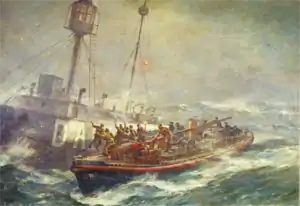 |
| 734 | George Shee | Saunders-Roe, Cowes | 1930–1958 1958 |
Torbay Relief fleet |
Sold December 1958 | |
| 735 | William and Clara Ryland | Saunders-Roe, Cowes | 1930–1957 | Weymouth | Sold 1958 | |
| 754 | Lloyds | Groves & Guttridge, Cowes | 1932–1957 1957–1969 |
Barra Island Relief fleet |
Sold January 1970 |  |
| 755 | Peter and Sarah Blake | J Samuel White, Cowes | 1932–1958 1958–1972 |
Fenit Relief fleet |
Sold October 1972 | |
| 776 | The Rankin | Groves & Guttridge, Cowes | 1935–1961 1961–1969 |
Aith Relief fleet |
Sold 1970 | |
| 860 | Southern Africa | Rowhedge Ironworks, Rowhedge | 1949–1967 1967–1981 |
Dover Relief fleet |
Sold July 1981 |
52 ft Barnett (Mk. I)
All built by J. Samuel White, Cowes
| ON[lower-alpha 1] | Name | In service | Principal Station | Disposal |
|---|---|---|---|---|
| 883 | Norman B Corlett | 1950–1973 1973–1981 |
New Brighton Relief fleet |
Sold February 1982 |
| 884 | St.Cybi (Civil Service No. 9)[2] | 1950–1980 1980–1985 |
Holyhead Relief fleet |
Sold 1986 |
| 889 | Hilton Briggs | 1951–1958 1959–1969 1969–1974 1974–1975 |
Aberdeen Fenit Relief fleet Invergordon |
Sold July 1976 |
| 890 | Thomas Forehead & Mary Rowse | 1952–1974 1974–1979 |
Plymouth Relief fleet |
Sold December 1982 |
| 898 | Joseph Hiram Chadwick | 1952–1967 1968–1977 1977–1979 |
Padstow Galway Bay Relief fleet |
Sold April 1980 |
| 899 | City of Glasgow 2 | 1952–1979 | Campbeltown | Sold April 1980 |
| 912 | Euphrosyne Kendal | 1954–1972 1973–1975 1975–1983 |
St.Peter Port Dunmore East Relief fleet |
Sold May 1983 |
| 913 | James & Margaret Boyd | 1954–1973 1973–1974 1974–1975 1975–1984 |
Stornoway Reserve Macduff Invergordon |
Sold January 1985 |
| 923 | John Gellatly Hyndman | 1955–1972 1972–1984 |
Stronsay Relief fleet |
Sold August 1985 |
| 924 | Archibald and Alexander M Paterson | 1955–1984 1985–1986 1986–1987 |
Stromness Arranmore Lowestoft |
Sold May 1989 |
52 ft Barnett (Mk. II)
| ON[lower-alpha 1] | Name | Builder | In service | Principal Station | Disposal | Image |
|---|---|---|---|---|---|---|
| 935 | R.A.Colby Cubbin No. 3 | J Samuel White, Cowes | 1957–1984 | Barra Island | Sold November 1984 | |
| 936 | E.M.M.Gordon Cubbin | J Samuel White, Cowes | 1957–1982 1982–1985 |
Mallaig Relief fleet |
Sold 1985 | |
| 938 | Rowland Watts | Groves & Guttridge, Cowes | 1957–1983 1983–1985 |
Valentia Relief fleet |
Sold 1985 to Brendan Walsh, Ballinskelligs, Co. Kerry. Used for Skelligs Michael landing trips. | |
| 939 | Frank Spiller Locke | Groves & Guttridge, Cowes | 1957–1976 1977–1985 |
Weymouth Galway Bay |
Sold October 1986 | |
| 943 | Claude Cecil Staniforth | Groves & Guttridge, Cowes | 1958–1978 1978–1985 |
Lerwick Arranmore |
Sold November 1985 | |
| 944 | Ramsay Dyce | Groves & Guttridge, Cowes | 1958–1976 1976–1978 1978–1985 |
Aberdeen Relief fleet Lochinver |
Sold August 1985 | 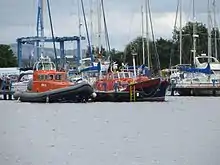 Ramsay Dyce (and Medina-class lifeboat MRI42 to starboard) at Glasson Dock |
| 945 | Princess Alexandra of Kent | J Samuel White, Cowes | 1958–1975 1975–1983 |
Torbay Relief fleet |
Sold 1984 | |
| 949 | Ethel Mary | Groves & Guttridge, Cowes | 1959–1985 1985–1987 1987–1988 |
Ballycotton Relief fleet Baltimore |
Last on station. Sold 1989 | |
| 952 | Duke of Cornwall (Civil Service No. 33) | Groves & Guttridge, Cowes | 1961–1984 1984 1984–1989 |
The Lizard Padstow Relief fleet |
Sold 1989 | 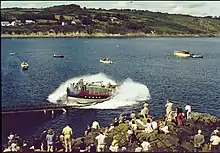 RNLB Duke of Cornwall (Civil Service No,33) |
| 956 | John and Francis MacFarlane | J Samuel White, Cowes | 1961–1986 | Aith | Sold October 1986 |
- ON is the RNLI's Official Number of the boat.
References
- "RNLB William and Harriot". RNLI. Retrieved 23 April 2012.
- "The RNLI Chatham Museum". RNLI. Archived from the original on 14 December 2005. Retrieved 23 April 2012.